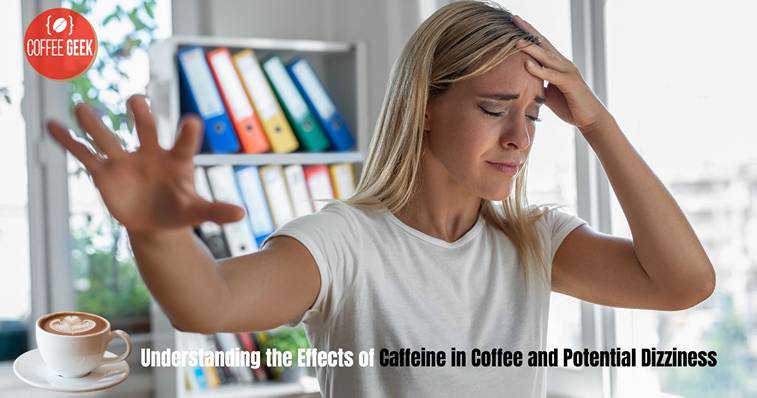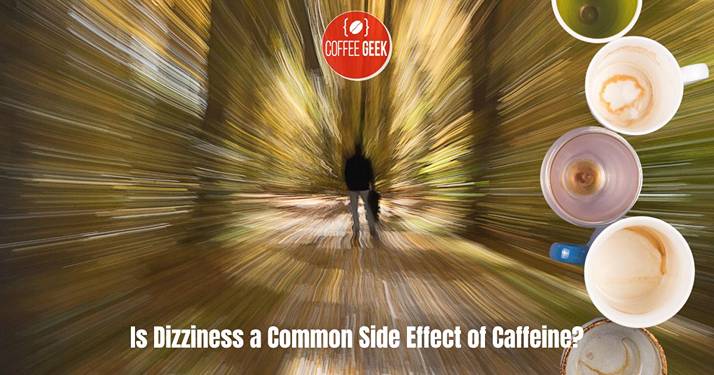Ah, the delightful aroma of a fresh cup of coffee, the sheer joy it brings to the taste buds, and the quick jolt it gives to the senses! Indeed, it’s no secret that coffee is a well-loved stimulant worldwide.
But, ever wondered if sipping this delectable caffeinated drink a bit too much can turn things not-so-pleasant? Can coffee make you pass out?
Can the level of caffeine in your beloved coffee make you feel dizzy or, worse, make you pass out? Grab your cup of joe (perhaps a decaf?) and let’s dive in!
- Understanding the Effects of Caffeine in Coffee and Potential Dizziness
- Can Drinking Much Coffee Make You Feel Dizzy?
- Exploring the Links Between Caffeine Overdose and Dizziness
- Sources of Caffeine and Understanding Caffeine Content In Coffees
- Preventing Dizziness and Unwanted Side Effects from Coffee Consumption
- The Final Word
- FAQ
Understanding the Effects of Caffeine in Coffee and Potential Dizziness
The Role of Caffeine as a Stimulant

Let’s chew the fat a bit on what caffeine is. Known as a stimulant, caffeine possesses stimulating properties that influence your nervous system, speeding up your heartbeat and leaving you feeling all jittery and spry.
But not everyone can ‘Espresso their love’ for this stimulant, as the interaction between caffeine and our nervous systems can react differently.
Can Coffee Make You Pass Out?
Do people feel dizzy after consuming too much caffeine? Well, as the saying goes, ‘Too much of anything is bad,’ and this goes for caffeine dosage too! While some may experience a robust energy surge, others may feel dizzy and even nauseous.

Let’s not forget some may also experience the rather ‘unwanted side effect’ of making a gazillion trips to the bathroom, thanks to caffeine’s diuretic effect.
How Much is Too Much of Caffeine?
Balance is vital in everything, including the amount of caffeine you consume each day. Even your favorite cup of coffee could turn a foe if you’re dealing with large amounts of caffeine.
Generally, a dose of caffeine up to 400 mg per day is considered safe. But remember, folks, everybody reacts to coffee differently!

Can Drinking Much Coffee Make You Feel Dizzy?
Impact of Excessive Caffeine on Your Nervous System
So, will your morning cup of coffee make you feel even more dizzy than your groovy dance moves?
Well, consuming excessive amounts of caffeine can overload your nervous system, causing you to feel dizzy, groggy, and may even slow down your caffeine processing abilities!

Common Unpleasant Symptoms of High Caffeine Consumption
If you experience dizziness when drinking too much coffee, it could be a symptom of caffeine overdose. Other nasties that tag along include an irregular heart rate, digestive issues, and jittering like a tap dancer.
Identifying Sensitivity to Caffeine and its Effects
Some folks are just more sensitive to caffeine. If you’re one of those unlucky souls, you may experience symptoms even with a small amount of caffeine. So, be wary when consuming that black coffee or energy drink!
Exploring the Links Between Caffeine Overdose and Dizziness
Caffeine Overdose: Recognising the Symptoms
Can the caffeine in your coffee cause dizziness to the point of making you pass out? If you feel dizzy after drinking coffee or experience symptoms like a racing heartbeat, these might indicate a caffeine overdose. Yikes!
Impact of Caffeine Overdose on Heart Rate and Cardiovascular System
Caffeine overdose doesn’t just stop at making you feel all woozy. It can also have a significant impact on your heart rate and overall cardiovascular system. Overdoing your caffeine dose may cause heart palpitations, high blood pressure or even a heart attack!
Nausea and Dizziness: Signs of Too Much Caffeine

If the twirling room is not due to a spinning chair, excessive caffeine might be the culprit.
Nausea and dizziness are classic signs of too much caffeine, and witnessing these symptoms indicates you need to cut back on your daily caffeine dosage ASAP!
Sources of Caffeine and Understanding Caffeine Content In Coffees
Caffeine Comparison: Regular Coffee vs Energy Drinks
The caffeine content in your regular coffee can be sneaky.
Did you know that the caffeine in coffee is often higher than in an energy drink? Every cup of coffee contains varying levels of caffeine, making it crucial to know your drink’s caffeine per serving ratio!

Decoding Caffeine Content: How Much Caffeine is in Your Cup of Coffee
Knowing the caffeine content in the coffee we gulp down daily is essential, especially for those sensitive to caffeine. How else are we supposed to keep a tab on our caffeine intake?
Considerations for Daily Caffeine Intake
It’s critical to limit daily caffeine use to stay out of the danger zone. You might love having several cups of coffee per day, but remember, every coffee you drink adds to your daily caffeine intake!
Preventing Dizziness and Unwanted Side Effects from Coffee Consumption
How to Balance Your Caffeine Intake to Avoid Dizziness
Keeping your consumption of caffeine in check can help avoid dizziness and other side effects.
What’s the trick, you ask? The answer is as simple as keeping a tab on how much coffee you gulp down daily and exploring alternatives as needed.
Reducing Caffeine: Alternatives to Regular Coffee

If traditional coffee makes you feel a tad too twirly, alternatives like decaf coffee or herbal teas can be your new go-to. Trust us, it’s better than experiencing unwanted dizziness from excessive caffeine consumption!
Addressing Caffeine Overdose: When to Seek Medical Help
If you believe your love for coffee has led to an overdose of caffeine, it’s high time to seek medical help.
Don’t overlook symptoms like dizziness, heartbeat irregularities, or excessive jitters. Remember, it’s essential to treat an overdose seriously!
| Factors | Information |
|---|---|
| Caffeine Content | Coffee contains caffeine, a stimulant that can affect the central nervous system. |
| Normal Caffeine Limits | Moderate caffeine intake (about 400mg per day for most adults) is generally considered safe. |
| Individual Sensitivity | People have different tolerances to caffeine; some may be more sensitive and experience symptoms. |
| Overconsumption Risks | Excessive caffeine intake can lead to side effects like jitteriness, increased heart rate, insomnia. |
| Passing Out Rarely | Passing out from coffee alone is rare and usually requires an extremely high caffeine dose. |
| Other Factors | Factors like underlying health conditions, medications, and dehydration can contribute to effects. |
| Balanced Consumption | Moderation is key; balanced caffeine intake along with hydration and a healthy lifestyle is crucial. |
The Final Word
The question of whether coffee can make you pass out is tied to understanding how caffeine, a key component of coffee, affects the body.
While caffeine is generally safe to consume in moderate amounts, its effects on the nervous system can sometimes lead to adverse reactions, especially when ingested in large quantities.
Caffeine works by antagonizing adenosine receptors in the brain, which contributes to its stimulatory effects. This action can lead to an increase in blood pressure and heart rate.
In some individuals, particularly those with a pre-existing heart condition, these changes can be significant. However, it may not always lead to severe consequences like passing out.
The associated with ingesting too much caffeine symptoms include nausea, migraine, jitteriness, and in extreme cases, an impact on the nervous system that could potentially lead to fainting.
However, these extreme reactions are not common and usually occur when an unusually large amount of caffeine is ingested.
Caffeine absorption varies from person to person, and what might be a moderate amount for one individual could be excessive for another.
It’s important to note that balancing out brain chemicals with caffeine can have beneficial effects as well, such as improving alertness and concentration.
Caffeine intake can lead to positive outcomes when consumed in moderation. However, if you’ve had too much caffeine and experience adverse symptoms, it’s crucial to seek medical advice.
A doctor will likely assess your caffeine intake in relation to your overall health, dietary habits, and any existing health conditions.
In conclusion, while caffeine, including that found in coffee, can have stimulatory effects of caffeine, it is generally safe when consumed responsibly.
The likelihood of coffee causing someone to pass out is relatively low, but it’s important to be aware of how your body’s reaction to caffeine and to consume it in moderation.
For individuals with certain health conditions, particularly those affecting the heart, consulting with a healthcare professional regarding caffeine consumption is advisable.
FAQ
Can consuming caffeine cause dizziness after drinking coffee?
Absolutely! In some cases, caffeine can also mess with your equilibrium, causing dizziness.
It’s like your body is on a roller coaster ride without your permission. So, next time you feel like dancing on a tightrope after a cup of joe, you know why!
What symptoms of caffeine overdose should I look out for?
Oh, it’s a lineup you wouldn’t want to meet in a dark alley.
Symptoms may include nausea, irregular heartbeat, (like your own personal drummer’s gone rogue!), restlessness (who needs sleep anyway, right?), and let’s not forget, a possible bout of jitteriness and dizziness after drinking coffee.
If feeling like your inner Energizer bunny ain’t your thing, you might want to slow down caffeine – your consumption of caffeine, buddy!
Can caffeine exacerbate insomnia?
Yes, my friend! Caffeine is a stimulant, and it’s like that over-excited party guest who over-stays their welcome.
Cue the endless nights of staring at the ceiling and counting sheep! It sure does make getting your beauty sleep a struggle!
How many milligrams of caffeine per day is considered safe?
Well, the sweet spot is about 400 mg of caffeine per day for an average adult (that’s roughly 4 cups of your favorite perk-me-up).
Any more could turn you into a jittery, sleepless, dizzy dancing queen! So, balance the buzz, coffee champ!
What are the adverse effects of caffeine on the central nervous system?
Yikes, where do I start? Caffeine can hijack your central nervous system faster than a squirrel gets a nut.
It can cause restlessness, insomnia, irregular heartbeat, and oh- did I mention the feeling of the world tip-toeing under your feet due to dizziness?
Can dizziness caused by coffee consumption lead to passing out?
Scary as it sounds, in extreme cases it might. If you’re chugging caffeine like water and notice things start going wonky (like a sudden rapid increase in heart rate or dizziness), it’s probably better to switch to decaf and call your primary care doctor.
Safety before sips, after all!
What are some ways to lessen these unpleasant side effects?
Your quest for a jitterless Joe journey starts with less caffeine! Also, try to balance it out with plenty of water because caffeine can sometimes lead to dehydration.
If symptoms persist, make sure you ring up your doctor to get the lowdown.
Could caffeine consumption lead to an increased blood flow to the brain?
You hit the coffee bean on the head there! Caffeine can increase the blood flow in your brain, crank up the volume on your alertness and cause a case of the spins. It’s like a rock and roll concert in your head—fun until it’s not!
Can consuming caffeine cause an irregular heartbeat?
It certainly can! Consuming caffeine is like giving your heart its own personal salsa lesson – great if you’re into cardio, not so great if you prefer a slower waltz. If your ticker starts doing the Macarena, take it easy on the caffeine.
Is there such a thing as caffeine sensitivity?
Contrary to popular belief, we’re not all built the same, especially when it comes to coffee. Some folks can handle a river of coffee, while others get a case of the “jitter-jitters” from a single cup.
That’s caffeine sensitivity for you. Know your limits, or you might end up dancing with dizziness.

